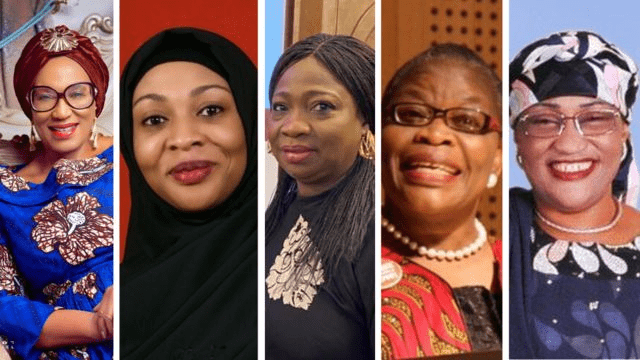After the long struggle to end military rule and return Nigeria to democracy, Nigerian women are still battling male dominance of the political landscape since 1999.
It is 22 years since Nigeria returned to democracy, the longest in the chequered history of the country. The country has grown in population and economy, but it has yet to be the best in terms of allowing women to take the mantles of political leadership despite their competence and experiences.
Since 1999, the country has had four presidents and about a hundred governors across the 36 states. However, none of them was a woman. Nigerian women have been widely acclaimed to have excelled in the private and public sectors but politics remains the only territory they still struggle to conquer.
At the federal level, neither the executive nor the legislative arm of government has been successfully headed by a woman.
Patricia Etteh, however, presided over the leadership of the House of Representatives for about five months. Elected on the platform of the Peoples Democratic Party, Etteh lost her position as the speaker as a result of an alleged scandal over the award of a N628m contract for the upgrade of her official residence and that of her deputy, Babangida Nguroye. Many still believe that she lost the position due to her gender.
Read Also: Obasanjo Under Fresh Fire Over Democracy Day Comments
The female gender has, however, risen to the peak in the judiciary, which is not elective but largely based on career progression. In the federal legislature, no woman has ever been President of the Senate or Deputy Senate President. Majority Leader of the Senate is the most senior position a woman has held. The federal executive has never had a woman vice-president, let alone president. Several women have been ministers but their percentage of the federal cabinet is still a subject of criticism.
Arguably, the most prominent female Nigerian to have attempted being president several times – on the platform of the Peoples Democratic Party – is Sarah Jibril. She had held key positions at the state level and later became a presidential aide. Prof Remi Sonaiya also contested the Presidency. Another prominent female presidential aspirant is Oby Ezekwesili.
In Nigeria, no female has been elected as governor. However, Dame Virginia Etiaba accidentally was the governor of Anambra State between November 2006 and February 2007. She is the first female governor in Nigeria’s history. She became governor when Peter Obi was impeached by the state legislature for alleged misconduct. Her reign came to an abrupt end when an appeal court nullified Obi’s impeachment and thereby returned him as the governor.
Nevertheless, several women have served as Deputy Governors, the majority of them from the South-West, especially Lagos State which has seen four females emerging as deputy governors.
Read Also: LATEST: See List of President Buhari Six Years Achievements As Released By Presidency
Also, a few women have headed state parliaments, one of them being Mrs Titi Oseni, who was the first female Speaker in Ogun State and Nigeria.
When lawmakers opposed affirmative action
The National Assembly has made efforts to allow more women to participate in politics and governance. But what would have been one of its greatest breakthroughs, however, suffered a major setback during the last constitutional review by the 8th National Assembly.
On July 26, 2017, when members of the Senate voted on constitution alteration bills, the majority of the lawmakers voted against affirmative action – 35 per cent and 20 per cent – at both the federal and state levels, respectively. They also rejected the proposed alteration to Section 25 of the constitution to guarantee a married woman’s right to choose either her origin by birth or by marriage for appointment or election.
When it appeared that the Federal Government of Nigeria was breaching the 35 per cent affirmative action as contained in the National Gender Policy 2006, some civil society organisations had, in 2020, sued the government for alleged marginalisation of women under the regime of the President, Major General Muhammadu Buhari (retd).
The CSOs argued that the “overwhelmingly predominant appointment of the male gender into decision-making positions of the federation” was wrong, unlawful, unconstitutional, and a violation of the provisions of the earlier cited laws.
Meanwhile, the Minister of Women Affairs, Pauline Tallen, had earlier in the year demanded that the 35 per cent affirmative action in favour of the female gender be taken into consideration in the ongoing constitutional review by the National Assembly.
Follow us on Facebook
Post Disclaimer
The opinions, beliefs and viewpoints expressed by the author and forum participants on this website do not necessarily reflect the opinions, beliefs and viewpoints of Anaedo Online or official policies of the Anaedo Online.

